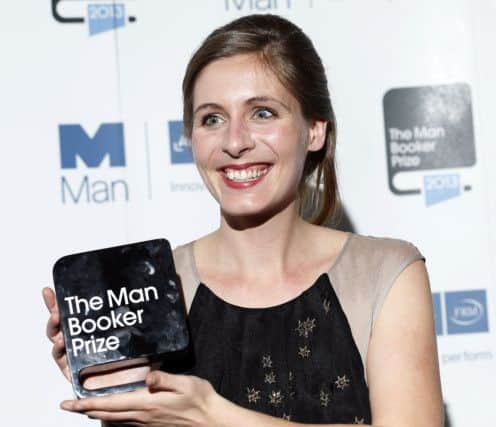Dani Garavelli: Women getting angry, thank goodness


On the one hand, internationally, they seemed to be storming every citadel. Janet Yellen was nominated to run the Federal Reserve, Alice Munro was awarded the Nobel Prize for Literature, Malala Yousafzai dominated the airwaves as she campaigned for women’s right to an education and Eleanor Catton became the youngest ever Man Booker Prize winner. For a glorious moment, women seemed to reign supreme. Then the shine was taken off Catton’s triumph by a patronising newspaper article which referred to her as a “chick”, and a “nerd, positively reeking of the library”, Kate Middleton was lauded for having achieved a washboard stomach three months after giving birth and normal service appeared to have resumed.
While elsewhere in the world women were at least visible, in Scotland they continued to be conspicuous by their absence. Less than a fortnight after the Tam Cowan stramash demonstrated a significant minority still believe it is acceptable to denigrate women for daring to take up football, it emerged that a Cosla commission established to “renew local democracy” chiefly comprised middle-aged white men (just four of its 20 members are women). As activist Kate Higgins has pointed out, this isn’t even surprising. You only have to glance at public life in Scotland to see women are vastly under-represented. On company boards, on public bodies, on awards judging panels and particularly on current affairs programmes, such as Newsnight Scotland and Scotland Tonight, male voices continue to dominate.
Advertisement
Hide AdAdvertisement
Hide AdIt should all be enough to drive one into a state of despair. But over the past six months or so, I’ve noticed something positive. Not any major advance in the battle for equality, but a groundswell of resistance across the world. Women are still being undermined on a daily basis; but whenever someone who has been raped is told they’ve been asking for it, whenever Mary Beard is criticised for not looking glam enough, whenever the tabloids berate a soap star for being too fat or too thin, there’s an immediate backlash, not just from veteran feminist campaigners, but from non-radical, non-politicised women who are fed up of having their opinions, their contributions, their very existence, ignored. It’s as if we have finally reached a tipping point. Those who would once have kept schtum for fear of being branded harpies are now prepared to take a stand. Everywhere women are reaching out to each other, setting up all-female pro and anti-independence groups and forming looser cross-party alliances on issues such as domestic violence, prostitution and greater media representation.
The internet is at least partially responsible for generating this new sense of commonality. Perhaps it started with @everydaysexism, the Twitter account that forced us to confront the scale of physical and emotional harassment some women are subjected to. Or perhaps it was Caroline Criado-Perez, who refused to scuttle off quietly in the face of online abuse. Whatever, there is an undercurrent of rebellion which seems to extend to those who have already broken through the glass ceiling and ought to be harnessed before it disappears. Not so long ago, it seemed successful women were reluctant to speak out on behalf of others for fear of jeopardising their own position. Worse still were those, like Thatcher, who pulled up the ladder behind them. But those women are a dying breed. Sisterly solidarity is all the rage now. Whatever you think of Hillary Clinton’s politics, she uses her position to campaign on women’s rights across the globe. And what about Catton? No sooner had she stepped off the winner’s podium than she was confronting the discrimination facing female writers and challenging the way they’re always asked what they feel rather than what they think.
There’s a head of steam building in the music industry too. Once it would have been seen as professional suicide to challenge the sexualisation of female pop stars, but ever since Miley Cyrus swung naked on a wrecking ball, a battalion of established performers – Sinead O’Connor, Annie Lennox and now Charlotte Church – have all criticised the moguls for making money from the pornification of very young girls.
These stands against discrimination are refreshing, but do they make a difference or is it all just so much noise? Certainly, when you look at the banks of men who line the seats in the House of Commons, it doesn’t feel as if much ground is being gained. And, though the uproar over the Cowan column led to his suspension by BBC Scotland, it wasn’t long before he was back on air. There will always be a contingent of men who humour us for a while in the hope we’ll pack up and go away.
Even so, I am beginning to feel more optimistic about the future. I believe women are getting angrier, more determined and more proactive in their attempt to push issues such as sexual violence, equal pay and objectification up the social and political agenda, and to effect the kind of change that means a run of female successes like the one we’ve seen in the past fortnight ceases to be astonishing. Those with a vested interest in clinging on to power will brand us as harridans and whiners like they’ve always done, but, as momentum builds, it will be increasingly difficult to fob us off. Far from crumbling under the weight of disapproval, we must keep on ranting about misogyny and highlighting injustice, until those who actively obstruct the fight for gender equality and those who make sympathetic noises, but do nothing concrete to support us, have no choice but to sit up and bloody well listen. «
Twitter: @DaniGaravelli1